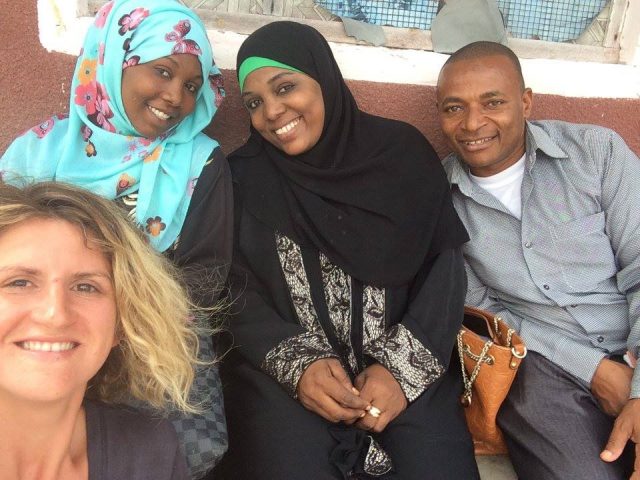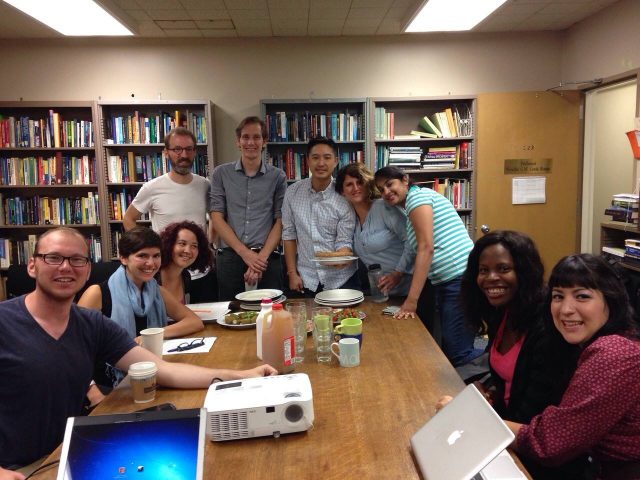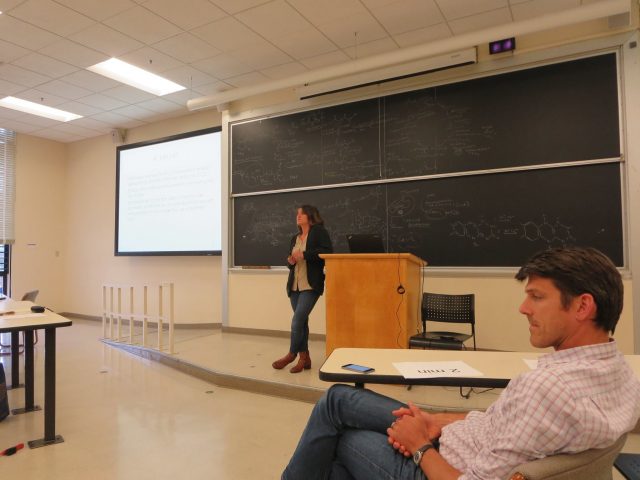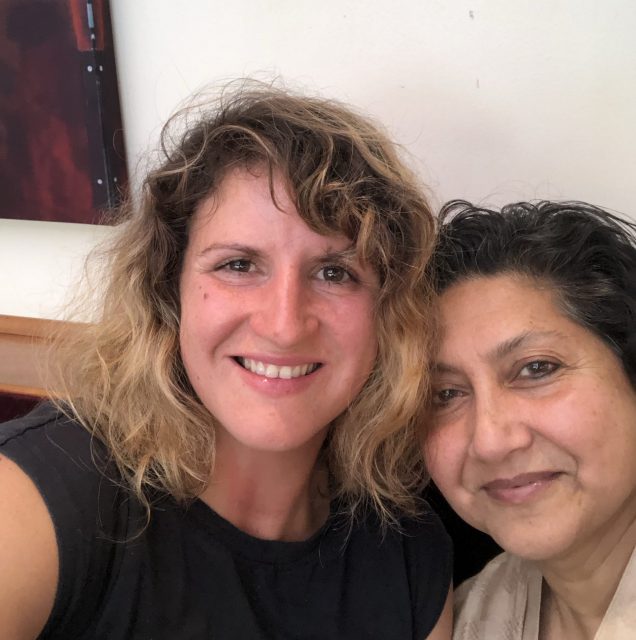Veronica Jacome recently completed her from the Energy and Resources Group (ERG) and holds a BS in Engineering Physics from University of Illinois at Urbana-Champaign. At ERG, Veronica focused on the terms of access within electricity services – investigating how policy, supply and infrastructure shape access and how access shapes vulnerabilities. Veronica’s work draws on both qualitative and quantitative methods, and has led her to Zanzibar, Tanzania to investigate the shifts in payment regime and assess the conditions that produce (un)reliable electricity systems. Prior to joining ERG, Veronica served as the Director of Development for Imagine Science and Films, and as a Peace Corps Volunteer teaching A-level physics in Tanzania.
What have you been working on that most excites you? Please describe your work.
My work has broadly looked at the ways in which quality of electricity and modes of commodification shape access and vulnerabilities in low-income communities. More recently, and something I am really excited about, I’ve been doing historical work. I’m beginning to create a historicized account of the difference in electricity services in the Global North and the Global South. What really excites me about this work is being able to engage in present day concepts and debates about the value of electricity, whether electricity is a right or not, and in general, ethical aspects of service delivery, in ways that are historically and culturally contingent.
What difference has researching with ERG made for you?
All the difference! ERG has allowed me to explore the vastness that is complex societal problems: they are physical, social, political – and I can engage these complexities without hesitation. In fact, ERG faculty have encouraged me to really expand on my interests in ways I think I would not have been able to in other departments.
 Why did you choose ERG, what made it unique for you?
Why did you choose ERG, what made it unique for you?
I honestly don’t think I “chose” ERG, I think ERG sort of chose me. I didn’t come to ERG knowing I was going to do a sort-of post-colonial investigation into the political economy of grid systems…. Certainly did not! I did however, write statements that were true to how I saw the world, how I understand justice oriented work to be inherently important… though I’m pretty sure I said I wanted to study solar thermal energy! But of course, I had to apply so this isn’t totally accurate either. When I applied back in 2012, the ERG website was a very simple, unclear thing to navigate. What I did read was a program willing to say that everything is connected, and if you want to study broader issues dealing with society and resources, you can do that however you think is necessary. For me it was joining the Program in Critical Theory here at Berkeley.
I do remember something unique about ERG and Berkeley in general. When I was writing my statements it felt natural, that ERG’s values aligned with mine and that’s not something I felt when writing my statements for say, Stanford.
 How has your background (cultural/gender/etc) been a part of your research and time at ERG?
How has your background (cultural/gender/etc) been a part of your research and time at ERG?
Well, I guess as a Venezuelan, contradictions in energy development and resource allocation have always been something I’ve thought about. Its an immensely resource-rich country with ever-increasing infrastructure crisis. These macro-level conditions impact people in their everyday (my family included), and while I have worked largely in Tanzania and not in Venezuela, this has always stayed with me, how the macro connects to the everyday.
Also, on an even more personal level, growing up in the midwest as a Venezuelan Buddhist, I have experienced being the “other” and the misconceptions one creates for oneself and others create of you through this process. I bring this with me in my work, as I constantly question my own position in doing work that socially embedded (studying electricity access in a low-income community while I fly home to one of the wealthiest most privileged spaces in the world). Because of these experiences and ways of thinking, my work has often been difficult, full of caveats, but I think more honest.
What advice do you have for prospective students, what can they expect?
This is a really difficult thing to answer, knowing how my path has been non-linear by any standard! But I think I would say be open. Be open to changing while at ERG, and you changing ERG. That’s what I think progress looks like. I don’t know if this is something everyone experiences but I personally felt like I was chasing something I thought I should do, not something I could see myself doing everyday. ERG is a place where you can explore these aspects of your work in really rich ways, I just had to be willing to let go a bit.
 In what ways is the work that you’ve been involved at ERG “cutting edge”?
In what ways is the work that you’ve been involved at ERG “cutting edge”?
I think the most “cutting edge” part of my work is it falling under this realm of “critically intimacy.” Gayatri Chakravorty Spivak, a scholar super influential in my work and certainly for others, explains that this sort of work, in my case critique of biases in electricity discourse, comes from a place of knowing it really well (she says “its critical intimacy, not critical distance” – from an interview between Spivak and Steven Paulson in LA Review of Books, 2016). I question discourse and rhetoric that gets attached to electricity development and infrastructure (un)reliability, and I do so through knowing not just the social aspects embedded within but also the ways electrons flow, outages and intermittency permeate, in a deeply physical sense. I see this as the cutting-edge aspect of my work.
Who have you been working with at ERG and how has this experience been?
My main adviser and just general go-to-person is Isha Ray. It’s been such a pleasure working with her that I’d do it all over again if I could (well, I don’t think she would let me!). I’ve also worked extensively with Duncan Callaway, whose expertise in power systems and willingness to engage in my more “out-there” ideas, and unconditional support has been invaluable. Finally, Dan Kammen – we started working together when I first got to ERG. He quickly saw that I was moving into a different territory, more geography, and needed other guidance but has been a really important mentor of mine throughout, and I’ve always been able to go to him for advice, something I’m just immensely grateful for.
 Any other comments (e.g. future interests, what you see yourself doing next, etc.):
Any other comments (e.g. future interests, what you see yourself doing next, etc.):
I’m going to continue doing similar work in the future – there is tons to do really. And I imagine being in an academic setting but also devoting myself to teaching. It’s something that has been important from the beginning, within academia and outside, and I see it as a wonderful place to put some of my work into practice.
 Why did you choose ERG, what made it unique for you?
I honestly don’t think I “chose” ERG, I think ERG sort of chose me. I didn’t come to ERG knowing I was going to do a sort-of post-colonial investigation into the political economy of grid systems…. Certainly did not! I did however, write statements that were true to how I saw the world, how I understand justice oriented work to be inherently important… though I’m pretty sure I said I wanted to study solar thermal energy! But of course, I had to apply so this isn’t totally accurate either. When I applied back in 2012, the ERG website was a very simple, unclear thing to navigate. What I did read was a program willing to say that everything is connected, and if you want to study broader issues dealing with society and resources, you can do that however you think is necessary. For me it was joining the Program in Critical Theory here at Berkeley.
I do remember something unique about ERG and Berkeley in general. When I was writing my statements it felt natural, that ERG’s values aligned with mine and that’s not something I felt when writing my statements for say, Stanford.
Why did you choose ERG, what made it unique for you?
I honestly don’t think I “chose” ERG, I think ERG sort of chose me. I didn’t come to ERG knowing I was going to do a sort-of post-colonial investigation into the political economy of grid systems…. Certainly did not! I did however, write statements that were true to how I saw the world, how I understand justice oriented work to be inherently important… though I’m pretty sure I said I wanted to study solar thermal energy! But of course, I had to apply so this isn’t totally accurate either. When I applied back in 2012, the ERG website was a very simple, unclear thing to navigate. What I did read was a program willing to say that everything is connected, and if you want to study broader issues dealing with society and resources, you can do that however you think is necessary. For me it was joining the Program in Critical Theory here at Berkeley.
I do remember something unique about ERG and Berkeley in general. When I was writing my statements it felt natural, that ERG’s values aligned with mine and that’s not something I felt when writing my statements for say, Stanford.
 How has your background (cultural/gender/etc) been a part of your research and time at ERG?
Well, I guess as a Venezuelan, contradictions in energy development and resource allocation have always been something I’ve thought about. Its an immensely resource-rich country with ever-increasing infrastructure crisis. These macro-level conditions impact people in their everyday (my family included), and while I have worked largely in Tanzania and not in Venezuela, this has always stayed with me, how the macro connects to the everyday.
Also, on an even more personal level, growing up in the midwest as a Venezuelan Buddhist, I have experienced being the “other” and the misconceptions one creates for oneself and others create of you through this process. I bring this with me in my work, as I constantly question my own position in doing work that socially embedded (studying electricity access in a low-income community while I fly home to one of the wealthiest most privileged spaces in the world). Because of these experiences and ways of thinking, my work has often been difficult, full of caveats, but I think more honest.
What advice do you have for prospective students, what can they expect?
This is a really difficult thing to answer, knowing how my path has been non-linear by any standard! But I think I would say be open. Be open to changing while at ERG, and you changing ERG. That’s what I think progress looks like. I don’t know if this is something everyone experiences but I personally felt like I was chasing something I thought I should do, not something I could see myself doing everyday. ERG is a place where you can explore these aspects of your work in really rich ways, I just had to be willing to let go a bit.
How has your background (cultural/gender/etc) been a part of your research and time at ERG?
Well, I guess as a Venezuelan, contradictions in energy development and resource allocation have always been something I’ve thought about. Its an immensely resource-rich country with ever-increasing infrastructure crisis. These macro-level conditions impact people in their everyday (my family included), and while I have worked largely in Tanzania and not in Venezuela, this has always stayed with me, how the macro connects to the everyday.
Also, on an even more personal level, growing up in the midwest as a Venezuelan Buddhist, I have experienced being the “other” and the misconceptions one creates for oneself and others create of you through this process. I bring this with me in my work, as I constantly question my own position in doing work that socially embedded (studying electricity access in a low-income community while I fly home to one of the wealthiest most privileged spaces in the world). Because of these experiences and ways of thinking, my work has often been difficult, full of caveats, but I think more honest.
What advice do you have for prospective students, what can they expect?
This is a really difficult thing to answer, knowing how my path has been non-linear by any standard! But I think I would say be open. Be open to changing while at ERG, and you changing ERG. That’s what I think progress looks like. I don’t know if this is something everyone experiences but I personally felt like I was chasing something I thought I should do, not something I could see myself doing everyday. ERG is a place where you can explore these aspects of your work in really rich ways, I just had to be willing to let go a bit.
 In what ways is the work that you’ve been involved at ERG “cutting edge”?
I think the most “cutting edge” part of my work is it falling under this realm of “critically intimacy.” Gayatri Chakravorty Spivak, a scholar super influential in my work and certainly for others, explains that this sort of work, in my case critique of biases in electricity discourse, comes from a place of knowing it really well (she says “its critical intimacy, not critical distance” – from an interview between Spivak and Steven Paulson in LA Review of Books, 2016). I question discourse and rhetoric that gets attached to electricity development and infrastructure (un)reliability, and I do so through knowing not just the social aspects embedded within but also the ways electrons flow, outages and intermittency permeate, in a deeply physical sense. I see this as the cutting-edge aspect of my work.
Who have you been working with at ERG and how has this experience been?
My main adviser and just general go-to-person is Isha Ray. It’s been such a pleasure working with her that I’d do it all over again if I could (well, I don’t think she would let me!). I’ve also worked extensively with Duncan Callaway, whose expertise in power systems and willingness to engage in my more “out-there” ideas, and unconditional support has been invaluable. Finally, Dan Kammen – we started working together when I first got to ERG. He quickly saw that I was moving into a different territory, more geography, and needed other guidance but has been a really important mentor of mine throughout, and I’ve always been able to go to him for advice, something I’m just immensely grateful for.
In what ways is the work that you’ve been involved at ERG “cutting edge”?
I think the most “cutting edge” part of my work is it falling under this realm of “critically intimacy.” Gayatri Chakravorty Spivak, a scholar super influential in my work and certainly for others, explains that this sort of work, in my case critique of biases in electricity discourse, comes from a place of knowing it really well (she says “its critical intimacy, not critical distance” – from an interview between Spivak and Steven Paulson in LA Review of Books, 2016). I question discourse and rhetoric that gets attached to electricity development and infrastructure (un)reliability, and I do so through knowing not just the social aspects embedded within but also the ways electrons flow, outages and intermittency permeate, in a deeply physical sense. I see this as the cutting-edge aspect of my work.
Who have you been working with at ERG and how has this experience been?
My main adviser and just general go-to-person is Isha Ray. It’s been such a pleasure working with her that I’d do it all over again if I could (well, I don’t think she would let me!). I’ve also worked extensively with Duncan Callaway, whose expertise in power systems and willingness to engage in my more “out-there” ideas, and unconditional support has been invaluable. Finally, Dan Kammen – we started working together when I first got to ERG. He quickly saw that I was moving into a different territory, more geography, and needed other guidance but has been a really important mentor of mine throughout, and I’ve always been able to go to him for advice, something I’m just immensely grateful for.
 Any other comments (e.g. future interests, what you see yourself doing next, etc.):
I’m going to continue doing similar work in the future – there is tons to do really. And I imagine being in an academic setting but also devoting myself to teaching. It’s something that has been important from the beginning, within academia and outside, and I see it as a wonderful place to put some of my work into practice.
Any other comments (e.g. future interests, what you see yourself doing next, etc.):
I’m going to continue doing similar work in the future – there is tons to do really. And I imagine being in an academic setting but also devoting myself to teaching. It’s something that has been important from the beginning, within academia and outside, and I see it as a wonderful place to put some of my work into practice.